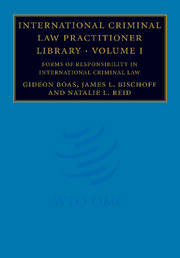Book contents
- Frontmatter
- Contents
- Foreword
- Table of authorities
- 1 Introduction
- 2 Joint criminal enterprise
- 3 Superior responsibility
- 4 Complicity and aiding and abetting
- 5 Planning, instigating and ordering
- 6 Concurrent convictions and sentencing
- 7 Conclusion
- Annex: Elements of forms of responsibility in international criminal law
- Index
1 - Introduction
Published online by Cambridge University Press: 08 January 2010
- Frontmatter
- Contents
- Foreword
- Table of authorities
- 1 Introduction
- 2 Joint criminal enterprise
- 3 Superior responsibility
- 4 Complicity and aiding and abetting
- 5 Planning, instigating and ordering
- 6 Concurrent convictions and sentencing
- 7 Conclusion
- Annex: Elements of forms of responsibility in international criminal law
- Index
Summary
Forms of responsibility in international criminal law
When the United Nations Security Council decided to establish the International Criminal Tribunal for the former Yugoslavia (ICTY), the first international criminal tribunal since the immediate post-war period, it tasked the Secretary-General with the preparation of the legal design of the new tribunal. The latter, in turn, instructed lawyers in the Secretariat of the international organisation, who drew on the relevant fundamental principles of customary international law and drafted the statute of the tribunal in accordance with those tenets. The result was a relatively spare document, which delimited the extent of the tribunal's personal, temporal, geographic and subject-matter jurisdiction in its first eight articles. After reaffirming that contemporary international criminal law was concerned with the penal responsibility of individuals, and articulating the core crimes which were to be the concern of the tribunal, the Statute of the International Criminal Tribunal for the Prosecution of Persons Responsible for Serious Violations of International Humanitarian Law Committed in the Territory of the former Yugoslavia since 1991 (‘ICTY Statute’) set forth a list of the ways in which an individual could be said to participate in, or be responsible for, those crimes:
A person who planned, instigated, ordered, committed or otherwise aided and abetted in the planning, preparation or execution of a crime referred to in articles 2 to 5 of the present Statute shall be individually responsible for the crime. […]
- Type
- Chapter
- Information
- International Criminal Law Practitioner Library , pp. 1 - 6Publisher: Cambridge University PressPrint publication year: 2008



